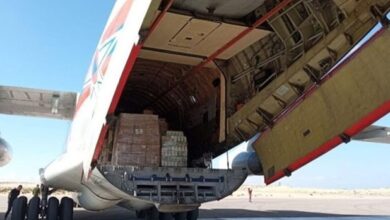US pressure for democracy in Egypt has encountered much skepticism from Cairo, according to a US Embassy cable sent to the Secretary of State in February 2010.
“The GoE [Government of Egypt] remains skeptical of our role in democracy promotion, arguing that any efforts to open up will result in empowering the Muslim Brotherhood,” says the report, leaked to Al-Masry Al-Youm and published here for the first time.
The cable is one of over 250,000 documents obtained from US embassies around the world by the whistle-blowing website WikiLeaks, and which began to be released this week.
The cable also includes criticisms of Egypt’s Emergency Law and the curtailing of civil liberties under the guise of counter-terrorism: “It will be useful to stress the USG's interest in GoE passage of a counterterrorism law that will protect civil liberties.”
The cable, which was sent one month following US President Barack Obama’s inauguration, was written against a background of prolonged US-Egypt tensions under the Bush presidency. During this time, and especially after the 9/11 attacks, the former US president publicly called for political reform in Egypt. Analysts, however, argue that Obama has pursued a different strategy, resorting to more traditional-style American diplomacy that favors stability over political reform.
In the cable, US diplomatic officials also praise the Egyptian security apparatus for effectively fighting terrorism while expressing some concern about the situation in North Sinai.
“The Egyptian government's active opposition to Islamist terrorism and effective intelligence and security services makes Egypt an unattractive safe haven for terror groups. However, Egypt's northern Sinai region is a base for the smuggling of arms and explosives into Gaza, and a transit point for Gazan Palestinians,” says the cable.
The cable also reveals the uncertainty of US diplomatic officials in Cairo about the future of the Egyptian presidency: “Presidential elections will be held in 2011. It is still unclear whether President [Hosni] Mubarak, in power for over 25 years, will decide to run again. Some believe that he is grooming his son, Gamal Mubarak, to succeed him as President.”
Mubarak, who has been in power since 1981, had a successful gall-bladder surgery in March that gave rise to speculation about his health. Safwat al-Sherif, secretary-general of the ruling National Democratic Party, said this month that the 82-year-old leader remains the NDP’s nominee for the upcoming presidential elections “unless he chooses otherwise.”
On Egyptian-Iranian relations, the cable describes Egypt as being threatened by Iran’s regional influence and suggests no signs of a genuine rapprochement between the two regimes.
“The immediate threat to Egypt comes from Iranian conspiracies with Hamas which he [President Hosni Mubarak] sees as the "brother" of his own most dangerous internal political threat, the Muslim Brotherhood, to stir up unrest in Gaza, but he is also concerned about Iranian machinations in Sudan and their efforts to create havoc elsewhere in the region, including in Yemen, Lebanon, and even the Sinai, via Hezbollah.”




